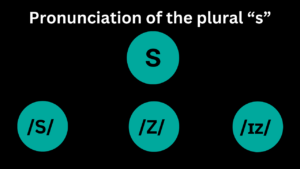Introduction
The pronunciation of the past simple ending “-ed” can vary depending on the sound at the end of the base verb and whether it is voiced or voiceless. There are three main ways to pronounce the “-ed” ending: /d/, /t/, or /ɪd/. Below are three rules to take into account when pronouncing “-ed”:
| Pronunciation of -ed | Ending sound | Example |
| /d/ | b g l m n s v y z | robbed lagged killed blamed happened increased lived stayed quizzed |
| /t/ | p k s ss sh ch tch f x | slapped liked focused missed finished reached watched sniffed fixed |
| /ɪd/ | t d | started ended |
Rule 1: the sound /d/
The “-ed” ending is pronounced as /d/ when the base verb ends in a voiced sound (b, g, l, m, n, r, s, v, w, y, z), except for /d/ itself.

For example:
- Rain ↦ rained
- Fail ↦ failed
- Rob ↦ robbed
- Follow ↦ Followed
- Play ↦ played
- Happen ↦ happened
- Saved ↦ saved
- Plan ↦ planned
Rule 2: The sound /t/
The “-ed” ending is pronounced as /t/ when the base verb ends in a voiceless sound. This includes sounds like /p/, /k/, /s/, /ʃ/ (sh), /tʃ/ (ch) or (tch), /f/, and /x/.
For example:
- Ask ↦ asked
- Stop ↦ stopped
- Watch ↦ watched
- Finish ↦ finished
- Laugh ↦ laughed
- Wash ↦ washed
- Laugh ↦ laughed
- Cook ↦ cooked
- Help ↦ helped
Rule 3: The sound /ɪd/
The “-ed” ending is pronounced as /ɪd/ when the base verb ends in a /t/ or /d/ sound.
For example:
- Want ↦ wanted
- Need ↦ needed
- Visit ↦ visited
- Shout ↦ shouted
- End ↦ ended
- Decide ↦ decided
- List ↦ listed
- Participate ↦ participated
Conclusion
It is important to note that the pronunciation of the past simple ending “-ed” depends on the sound at the end of the base verb, not the last letter of the verb. Additionally, the pronunciation of “-ed” can vary between different English accents and dialects
Remember to pay attention to the sound at the end of the base verb when pronouncing the “-ed” ending in the past simple tense.






